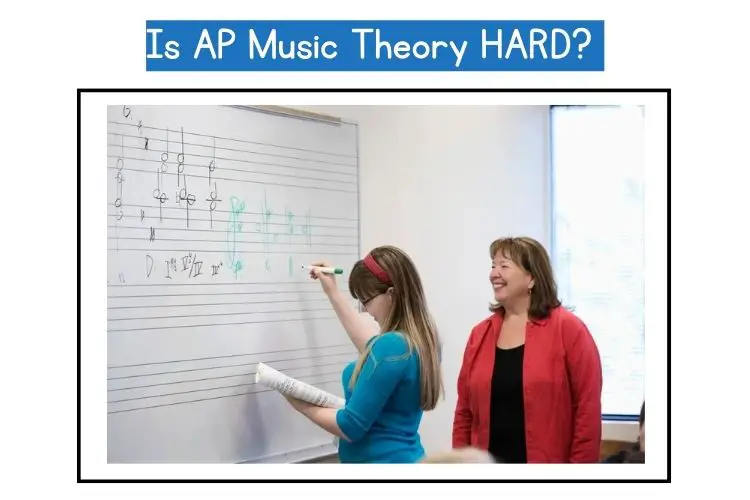Advanced Placement (AP) is an academic program in the United States and Canada developed by the College Board. Advanced Placement (AP) offers undergraduate university-level examinations and curricula to high school students.
With music being one of the most important and sought-after courses, AP also offers music theory courses and curriculums.
That being said, Advanced Placement (AP) Music Theory (also referred to as AP Music or AP Theory) is a course and examination offered in the US by its College Board as an integral part of the Advanced Placement Program.
This course and exam are offered to high school students whose aim is to earn credit for a college-level music theory course. All the core areas of music theory are being offered in this course.
Some of these areas include “low sight reading,” music terminology, musical phrasing/composition, history of music, chordal structure, cadences, and other vital areas of music theory/studies.
The AP Music Theory course is always recommended for students whose core and strongest abilities are in music, or students making plans to pursue college music majors.
However, one of the concerns of prospective students is always the difficulty level of the course.
Considering a lot of factors like curriculum, test score, pass rate and others, it would be safe to say that AP Music Theory is slightly harder than several other AP Courses and music theory courses you would get elsewhere. However, it is not impossible to pass or complete.
Table of Contents
About the AP Music Theory — A Brief History
Advanced Placement music theory, or AP music theory, is pretty similar to any other AP courses out there. Essentially, it gives high school students an opportunity to earn a credit score for enrolling at a university.
The College Board introduced Advanced Placement programs back in 1952. And the music theory course is one of 37 courses and also one of five that are in the arts category.
It was first initiated by the Ford Foundation after World War II and the program officially started in Gambier, Ohio at the Kenyon College.
Initially having only ten subjects, the AP program changed over the years and introduced a variety of other topics. Some of them were also cancelled, including Music Listening and Literature.
Eventually, the AP Music Theory course was introduced and it’s often done by high school students who plan to study in related fields.
The AP Music Theory Course Curriculum — The Things You Will Learn
The AP Music Theory curriculum is designed in a specific way to help you understand and recognize basic musical elements and then work from there to more advanced structures.
Ultimately, it will help you learn how to notate music that you hear and the ability to sightread a notated melody.
It comes with eight main units to cover. These are:
- Music Fundamentals 1
- Music Fundamentals 2
- Music Fundamentals 3
- Harmony and Voice Leading 1
- Harmony and Voice Leading 2
- Harmony and Voice Leading 3
- Harmony and Voice Leading 4
- Modes and Form
In the Music Fundamentals units, you’ll start with the very basics like pitch, intervals, note durations, rests, as well as other basic elements. You’ll then move on to connecting the dots with major and minor keys, melodies, chords, and even timbre and texture.
The Harmony and Voice Leading section, divided into four units, expands into the advanced stuff.
You’ll be further connecting the dots and exploring chords, chord progressions, and even moving on to embellishments, motives, and secondary functions.
Finally, the Mode and Form unit concentrates on modes of the natural major scale and their more practical implementation in music, as well as learning about the form of music pieces.
And in this part, you’ll also get the chance to learn about melodic relationships between various phrases.
3 Factors that Determine the Difficulty of AP Music Theory
What’s important to note about AP Music Theory is that, compared to your usual music theory classes, it moves much quicker. So it wouldn’t be that far off to say that the course is challenging in many ways.
The scoring is from 1 to 5. The passing grade might not be easy to define as different colleges accept different results but 3, 4, and 5 are widely accepted as passing grades. With this in mind, there are three main factors that you should consider here.
Pass Rate
As far as the passing rate for music theory goes, in 2022, the total sum of 3s, 4s, and 5s was 61.9 per cent while 18.7 per cent got the highest grade. Looking at other AP courses in arts, the highest score is more common.
But the overall passing rate is noticeably lower. Here is the overall distribution of grades for the AP Music Theory course:
| Grade | 5 | 4 | 3 | 2 | 1 |
| Percentage of students | 18.7% | 17.7% | 25.5% | 23.7% | 14.4% |
| Number of students | 2,922 | 2,763 | 3,970 | 3,697 | 2,242 |
Across all of the Advanced Placement courses, AP Music Theory passing rate is about average. Certain fields have a much higher rate while some have a far lower passing rate.
AP Research, for instance, had a passing rate of 82.7 per cent while AP Art and Drawing had 88.3 per cent. On the lower end, AP United States Government and Politics had only 48.6 per cent scoring a passing grade.
Course Material
Another way to assess the difficulty of the AP Music Theory course is to look into the course material. Looking at what the course encompasses, it is clear that this is not the easiest one out there.
In fact, it’s highly recommended that you already have at least some basic music theory knowledge before you get on with it. After all, the course’s goal is to get you to read music on sight and even write notation according to given melodies.
Apart from the basic elements, which include stuff like notation, rhythm, key signatures, and chords, AP Music Theory delves even into some more advanced stuff like advanced aural analysis.
Getting to stuff like melodic devices and harmonic sequences can be rough without prior knowledge.
Subject Skill
While not impossible to conquer, AP Music Theory will be pretty challenging for anyone without prior experience. One would need to possess great musical talent and determination if they want to go this way.
However, to anyone with prior knowledge, the course may not be as challenging. Sure, this is some college-level stuff that we can see in the course. But those looking to do the AP Music Theory course are usually people who are pretty invested in music in the first place.
The College Board recommends this course to those with prior experience with music theory. But this is not really a surprise since you’d not expect to see someone without any interest in music trying to take this course in order to get some extra credit.
Structure of the AP Music Theory Exams
The AP Music Theory exam itself is divided into three main parts. The first section is a multiple-choice test with a total of 75 questions.
They’re divided into 13 smaller parts, each with four to six questions. This part takes about one hour and 20 minutes and will make up 45 per cent of your total score.
During this first section, you’ll focus on basic questions about music theory. You’ll also be assessed on recognizing intervals and rhythmic patterns.
The next section of the exam, labelled as 2A, is a written part that takes about one hour and ten minutes.
It also makes up 45 per cent of your total score and includes melodic and harmonic dictation, writing from figured bass, writing from Roman numerals, and the final task that’s either a composition of a bass line or a harmonization of a melody.
Finally, the third part called 2B is only 10 minutes long and includes two sight-singing questions. This will be the final 10 per cent of your score.
What Score Gives a Credit?
The general rule is that, if you have a score of at least 3, you’ve passed. It’s the equivalent of grade C and usually requires at least 50 per cent of correct answers.
However, whether the minimum passing grade will give you a score depends on the college that you’re applying for.
Over the years, some more demanding colleges have changed what they find to be an acceptable grade. Certain colleges won’t even give any credit for the AP Music Theory exam, no matter how well you scored.
So if you’re looking to get credit, the safest way to go is to aim for the best result.
What Topics Does the AP Music Theory Exam Cover?
The whole point of this AP course is to get a certain skill set regarding music and music theory. You’re supposed to know how to identify intervals, basic notation elements, chords, and rhythm.
It also aims to teach you about notating music that you hear, sight reading, and working with some more advanced elements, including harmonization and composition.
With that in mind, the exam covers all that in about two hours and 40 minutes. The multiple-choice part includes fundamental music theory elements.
The questions based on the aural stimulus will include recognizing intervals, rhythmic patterns, as well as more complex concepts.
One part of the first section also includes an analysis of printed music scores. And in sections 2A and 2B, you’ll be doing melodic and rhythmic dictation, writing, composition, and sight reading.
Why take the AP Music Theory exam?
If you’re looking for a simple course to get some college credit, this isn’t for you. Firstly, it requires some previous knowledge of music theory. And secondly, some colleges won’t even give you credit for this AP exam.
The AP Music Theory exam is specifically for those highly interested in music and music theory. Obviously, if the bachelor’s degree that you’re aiming for is in any way related to music, this is the course that you’ll want to take.
If you have some music theory knowledge and want to expand on it, the course will also teach you a lot and will prepare you for higher education. So it’s not just about college credit but getting knowledge and experience on the matter as well.
Tips for Preparing for the AP Music Theory Exam
Before we proceed, bear in mind that there are no rules set in stone here. Just like with any other field, preparing for the music theory exam takes patience, consistency, and a lot of practice and hard work.
However, there are a few specific things to bear in mind if you want to get better results on the AP Music Theory exam. Here’s what we recommend:
- Start learning for the course in time, preferably in 10th grade if possible
- Be familiar with the basics before you start
- Take practice exams
- Learn and practice consistently and regularly
- Focus on practising dictation and sight reading
- Do ear training exercises
- Always seek feedback
- Be very organized about your studying and practising schedule
- Try to analyze all the music that you listen to
Conclusion
AP Music Theory exam isn’t exactly the easiest one. In fact, it’s highly recommended only for those who aim to study music-related topics in the future and those with prior basic knowledge and experience in music.
However, with the right approach and a lot of hard work, you’ll be able to get a hold of it. Remember — nothing is difficult if you’ve mastered the field well enough to fully understand it.


![Kaotica Eyeball vs Fatboy: ALL You Need to Know [2023]](https://performerlife.com/wp-content/uploads/2022/05/Kaotica-fatboy-211x150.jpg)

![What Happened To “Chief Keef”? [Everything to Know About This Rapper]](https://performerlife.com/wp-content/uploads/2022/05/Chief-Keef-211x150.jpg)